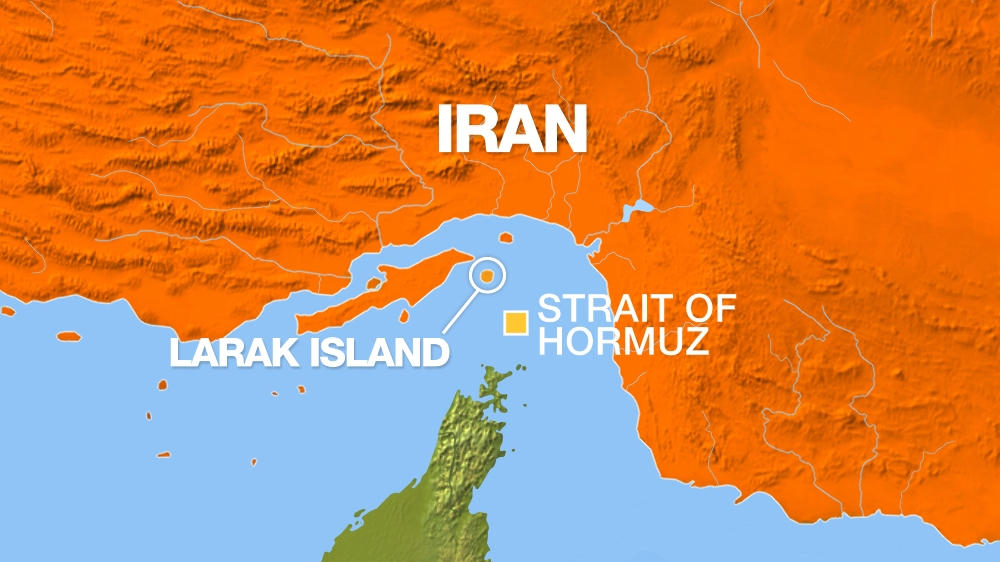Iran’s Rouhani hints at possible swap for seized tankers
President says if UK steps away from ‘wrong actions’ in Gibraltar, it will then get ‘appropriate response’ from Tehran.

Iran’s President Hassan Rouhani appears to have suggested that if the United Kingdom releases an Iranian tanker it apprehended off the coast of Gibraltar earlier this month, then his country will return a British-flagged vessel it seized last week.
“If Britain steps away from the wrong actions in Gibraltar, they will receive an appropriate response from Iran,” Rouhani said on Wednesday during a weekly cabinet meeting.
Keep reading
list of 4 itemsWho will be Iran’s next president? | Start Here
Oil slumps two percent on possible return of Iranian supply
Border security a common concern for Pakistan and Iran: Rouhani
The Grace-1 supertanker was seized off the British overseas territory on Spain’s southern coast on July 4 on suspicion it was shipping oil to Syria, in breach of European Union sanctions. Some two weeks later, Iran seized the British-flagged Stena Impero in the strategically important Strait of Hormuz, claiming that it had collided with a fishing boat and violated international law.
London and Tehran have denied the accusations in turn and descended into a feud over the ships’ seizures amid rising tensions between the United States and Iran in the Strait of Hormuz, the world’s most significant oil artery.
“It was the first time that he [Rouhani] seemed to link the seizure of a ship by the Revolutionary Guards Corps (IRGC) less than a week ago to the seizing in Gibraltar of the Iranian oil tanker,” said Al Jazeera’s Zein Basravi, reporting from Tehran.
“Does this perhaps suggest that releasing their vessel will prompt Iran to release the British-flagged vessel? Iran continues to say that its seizure of the vessel was legal, that it had wandered into Iran’s territorial waters, so perhaps not – but it certainly is a tip of the hat in that direction.”

Also on Wednesday, an Iranian official reported that the UK sent a mediator to Iran to discuss the freeing of the Stena Impero.
Mohammad Mohammadi Golpayegani, the head of the Supreme Leader’s office, provided no details about the British mediator’s trip but made an ironic reference to Britain’s involvement during colonial times in Iranian affairs.
“A country that at one time appointed ministers and lawyers in Iran has reached a point where they send a mediator and plead for their ship to be freed,” Mohammadi Golpayegani said, according to the semi-official Tasnim news site.
However, a British diplomatic source denied that the UK had sent any such representatives.
“We are not aware of any representatives being sent as mediators to Iran,” the source was quoted as saying by Reuters news agency.
Denial of Iranian drones intercepted
Tensions in the Gulf region are high, with fears of a military confrontation between the US and IRan.
Washington has blamed Tehran for a series of attacks since mid-May on shipping around the Strait of Hormuz, allegations denied by Iran.
Last month, Iran downed a US military surveillance drone in the Gulf with a surface-to-air missile. Iran says the drone was in its airspace, but Washington says it was in international skies.
US President Donald Trump said at the time he had been prepared to strike three Iranian targets in retaliation but called off the operation at the last minute because such a response would not have been “proportionate”.
“If the Americans violate Iranian airspace again with another drone, then they will receive the same response,” Rouhani said.
Meanwhile, Iranian officials denied again that any of Iran’s drones were intercepted after the US military said it took aim at two of them last week.
US Central Command said one Iranian drone crashed into the sea after the USS Boxer took “defensive action” against it last Thursday. It said the Boxer also “engaged” a second Iranian drone at the same time, but could not confirm it was destroyed.
General Amir Hatami, Iran’s defence minister, told reporters on Wednesday that “if someone claims he should provide evidence,” adding that “none of our drones have been intercepted”.
Iran ready for ‘just’ negotiations
The current US-Iran tensions stem from Trump’s move last year to pull the US from a landmark nuclear accord signed between Iran and world powers in 2015. Since then, Washington has reinstated sweeping sanctions against Tehran and has also expanded its military presence in the region.
Rouhani said that Iran was ready for “just” negotiations – but not if they meant surrender.
He seemed to be referring to possible negotiations with the US.
“As long as I have the responsibility for the executive duties of the country, we are completely ready for just, legal and honest negotiations to solve the problems,” Rouhani said, according to his official website.
“But at the same time we are not ready to sit at the table of surrender under the name of negotiations.”
The Iranian president also warned that if negotiations with the remaining signatories of the nuclear deal did not reach a result, Iran would take a further step in “reducing our commitments under the deal at the end of the 60-day period”.
Diplomatic efforts have intensified since July 7, when Iran increased the level of uranium enrichment from 3.67 percent to 4.5 percent – just above the limit set under the deal – following the expiration of a two-month deadline it had set to European powers to protect it from US sanctions. The following day, Tehran gave Europe another 60 days to come up with a mechanism to facilitate oil trade amid growing US-Iran tensions and international fears that hawks in Washington are attempting to draw the countries into an armed confrontation.